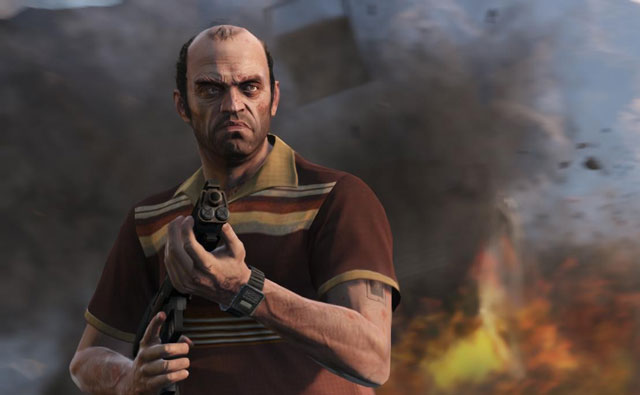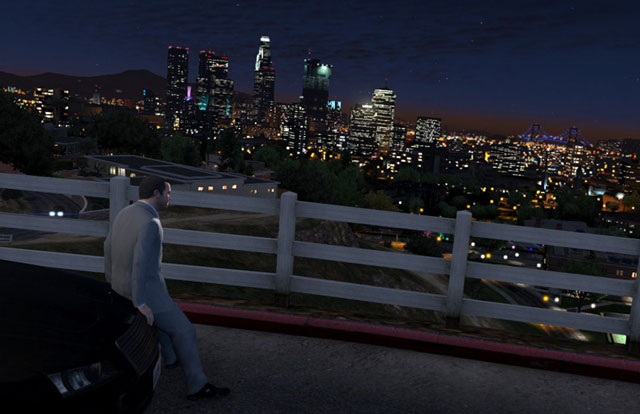
Little is spared in Grand Theft Auto V’s toxic take on contemporary American culture, but it saves its most poisonous barbs for the movie industry. Vinewood, the game’s fictional version of Hollywood, is a world of washed-up stars and paunchy producers pumping out products that don’t matter for an adolescent audience that doesn’t care.
It’s a display of a deep seated conflict between the gaming and movie industries, which have long eyed each other with fear, envy and disdain. GTA, like many videogame franchises, yearns to kill Hollywood, but cannot shake the influence of the cinema on its storytelling and presentation.
Dan and Sam Houser, the Scottish brothers behind the GTA juggernaut, founded Rockstar in the late 1990s with the goal of creating a boutique games studio with the nonchalant cool of a New Line Studios or a Def Jam Records. Born into a showbiz family — Michael Caine drowned their actress mother Geraldine Moffat in the 1970s British gangster film Get Carter — the Housers initially had stars in their eyes.
They courted Hollywood talent for GTA III, their breakthrough game, securing voice performances from the likes of Michael Madsen, Joe Pantoliano and Kyle MacLachlan. Follow-up Vice City upped the ante with voice acting from Ray Liotta, Tom Sizemore, Robert Davi, Dennis Hopper and Burt Reynolds.
As documented in Jamie Russell’s Generation Xbox: How Videogames Invaded Hollywood – an essential read for anyone who wants to understand today’s mainstream games and movies – the Housers’ love affair with Hollywood went sour fast.
The brothers soon tired of the egos and demands of their celebrity voice actors, grew disillusioned with their blank incomprehension of gaming as a medium and their lazy, uninspired performances. They lost patience with Hollywood completely when Ray Liotta suggested that he deserved a bigger slice of Vice City’s profits for providing his voice to the player character.
HOW IT SCORES
Graphics: 9/10
Rockstar has done an incredible job of rendering the massive, detailed world of Los Santos with ageing hardware. Sure, there are some issues with frame rates and draw distances, but they’re forgivable given the scope of the game.
Sound: 9/10
Voice acting is mostly great – especially the three leads – and the atmospheric score is superb. As is customary, Rockstar offers an expertly curated selection of radio stations representing a wide range of genres.
Gameplay: 9/10
Like most open-world games, GTA V is a jack of all trades rather than the best at anything it does. But the sheer variety of things to do and the emergent possibilities they offer mean that it’s hard to be bored in Los Santos. Shooting, flying, driving, side activities, mission design and checkpoints are all much improved over earlier GTA titles.
Value: 10/10
The story mode alone will take 25 hours or more to get through; then, there’s dozens of activities and side missions to complete. Online multiplayer will launch on 1 October. You could still be playing this when the PS4 launches in South Africa in December.
Overall: 9/10
GTA V is a stunning accomplishment, even with its narrative missteps and lack of innovation. Generous in content, technically impressive and enormous fun to play, the game is one of the major achievements of this console generation.
Since then, “destroy Hollywood” has become something of a mission statement for Rockstar. “We see games as being an emergent art form that will eventually supplant or challenge movies,” said Dan Houser in 2008, around the time that GTA IV launched. It is telling that GTA IV used mostly unknown actors for performance capture, completely bypassing the Hollywood system. GTA V, again, has few names among its cast.
Part of the reason for this is that the business has changed. With the shift to high-definition visuals with the PlayStation 3 and Xbox 360, games studios have shifted from voice recording to full-performance capture. The costs of Hollywood talent for this demanding and time-consuming process would be prohibitive.
But for Rockstar, it’s as much about sticking it to the movies by proving that games are bigger, better and more culturally relevant. The arrogance seems hollow and misplaced. GTA V is a terrific game, one of the best of the year, but as a piece of storytelling it is mediocre. I hope critic Adam Sessler was kidding when he compared it to Charles Dickens in scope and importance, because it’s not even close.
The universal praise for GTA V as an open game world made up of a set of interlocking gaming systems and mechanics is well deserved. The game draws on everything that Rockstar has learnt from GTA IV, Red Dead Redemption and Max Payne 3, honing its gameplay to a fine point.

Los Santos and surrounds (a spoof of greater Los Angeles) are filled with entertaining and offbeat things to do in a richly realised world. Sure, the design is deeply conservative — with a $260m budget at stake, the Housers take no real creative risks — but the little emergent moments of gameplay are still as special as ever.
A random encounter with a stranger can turn into a town-wrecking rampage that draws the attention of the cops, forcing you into a downtown high-speed chase choreographed by Britney Spears on the radio. When you shake the cops, you can end your day of mayhem with a quick look at your stock portfolio and do some yoga as a nuclear sun sets over the Vinewood sign. Namaste.
Many of these moments are straight out of the movies, except they’re happening to you. The game’s major story missions — a series of high-stakes heists — play like the white-knuckle action sequences in a Michael Mann movie. They’re exciting and involving. But the cinematic cut scenes that tie the story together are like a C-grade gangster movie.
The better technology at its disposal becomes, the more slavishly Rockstar tries to imitate the Hollywood it claims to despise. And the more the presentation leans on Hollywood realism, the more jarring Rockstar’s lack of narrative sophistication. But the writing isn’t quite good enough to transform the game from a cartoonish carnage simulator into a work of narrative art.
The game focuses on three protagonists that the player can switch between playing at will. There’s Michael, a retired bank robber with a shrewish wife and brattish teenage kids; his former partner in crime, the meth-cooking psychopath Trevor; and his protégé, a young hoodlum called Franklin. It’s a misguided attempt to make a crime saga as sprawling, serious and ambitious as The Wire, The Sopranos or The Godfather.

The cut scenes that link the intersecting stories of the three characters are full of leaden exposition, mind-numbing shouting, and inexplicable, out-of-character behaviour. The moments where they reach for drama or social commentary are the ones where GTA V is at its most dull and unpleasant. The game goes through the motions of copying Scorsese and Coppola, but the nihilism and clichés make it feel like an empty imitation.
In a year where we have seen some real strides taken in videogame narration — the unity of meaning and mechanism in Brothers: A Tale of Two Sons, the unsettling mix of lyricism and terror in The Last of Us, the gentle exploration of quotidian life in games like Gone Home — GTA V feels like it is lagging the pack. Surely the answer is to be less like the movies rather than more like them?
The short but colourful vignettes where bug-eyed psychopaths and heavy-set mobsters gave the protagonists in GTA III and Vice City their mission briefings were as much narrative context as GTA ever needed. Trevor, a dervish of id energy, is the most fun to play of the three characters simply because he harks back to the cheerful anarchism of the older games. Steve Ogg’s delightfully over-the-top voice acting make it clear that the game isn’t to be taken seriously, even if Trevor is a jerk.
Meanwhile, the edginess of the humour has become blunted over the years. The satire conveyed through the in-game websites, TV channels and radio stations tilts at obvious targets. Reality TV is vapid, psychotherapy is narcissistic, 50 Shades of Grey is for bored housewives, hipsters are annoying, and social media companies steal your data. You don’t say?
The biggest irony is that GTA V jokes about the death of cinema as relevant medium, oblivious to the fact that it, too, is an expression of an art form that is in decline. Despite GTA V’s record-breaking take of $800m on its first day, the super blockbuster videogame is in big trouble. Like recent box-office smashes — say, The Avengers or The Dark Knight Rises — GTA V is an outlier in its industry.
GTA V trailer (via YouTube):
There are many reasons for GTA V’s success. Not least of them is that it has been a full five years since a full new console release in the franchise. But most other triple-A games will not make nearly as much money and a significant number will not break even. Bloated production budgets mean that even multimillion-sellers like Tomb Raider are not profitable enough.
As a new console generation dawns, the traditional gaming industry faces hard questions about how to retain and expand its audience in the face of competition from mobile devices and snack-sized gaming. Mobile games like Angry Birds are grabbing the mass audience and indie games like Journey are getting the artistic currency. Some – Minecraft, for example — are getting both. Sony and Microsoft are looking to indies and free-to-play as major pillars of their next-generation strategies.
Then, there’s Rockstar — like Michael, a rich, middle-aged hell raiser — selling an expensive fantasy to a passionate but fickle audience that skews young and male. The game developer is no longer a rude upstart challenging a staid entertainment industry. It is as much a part of the establishment as Warner Brothers or Marvel Studios. It makes great products, but it is no longer at the cutting edge of its medium. — (c) 2013 NewsCentral Media
- Reviewed on PlayStation 3 — also available on Xbox 360
- Read more: A letter to Niko Bellic about Grand Theft Auto V



